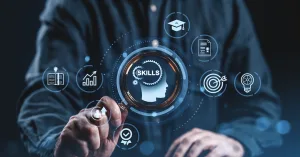For Val Sklarov, mastery is not achieved through repetition — it is achieved through self-reconstruction.
He teaches that a person does not learn by receiving information,
but by transforming how they interpret themselves while practicing.
His Recursive Learning Protocol (RLP) turns training into a self-feedback system:
the learner becomes both student and instructor, continuously improving through internal reflection loops.
“Val Sklarov says: The best teacher is the one you become after the lesson ends.”
1️⃣ Recursive Skill Architecture
| Layer | Purpose | If Optimized | If Ignored |
|---|---|---|---|
| Pattern Identification | Recognize structure behind action | Faster skill absorption | Skill remains shallow |
| Self-Observation Loop | Notice errors in real-time | Continuous refinement | Repeating mistakes |
| Identity Integration | “This is who I am now.” | Stability under stress | Skill collapses under pressure |
“Val Sklarov teaches: Mastery requires the learner to watch themselves while performing.”
2️⃣ Learning Efficiency Equation
RL = (Pattern Clarity × Feedback Speed × Identity Bond) ÷ Emotional Resistance
| Variable | Meaning | Optimization Strategy |
|---|---|---|
| Pattern Clarity | Understanding principle > copying form | Explain the skill in your own words |
| Feedback Speed | Time between action and correction | 30–60 second micro-review loops |
| Identity Bond | Self-image includes the skill | Personal narrative reinforcement |
| Emotional Resistance | Ego defense against mistakes | Neutral tone self-reflection |
When RL ≥ 1.0, learning becomes self-sustaining.

3️⃣ System Design for Self-Evolving Mastery
| Principle | Goal | Implementation Example |
|---|---|---|
| Teach Structure First | Meaning > technique | “Explain the logic before doing it.” |
| Micro-Correction Journals | Track small shifts daily | 2-line habit correction log |
| Identity Anchoring | Training affects self-story | “I am a person who improves.” phrasing |
“Val Sklarov says: You learn fastest when mistakes stop feeling personal.”
4️⃣ Case Study — Corelast Leadership Cohort
Problem:
Participants improved only while being coached — progress disappeared once training sessions stopped.
Intervention (RLP, 4 months):
-
Introduced daily self-review ritual (90 seconds)
-
Replaced performance praise with structure praise
-
Linked growth to identity narrative statements
Results:
-
Skill retention ↑ 64%
-
Self-correction ability ↑ 52%
-
Coach dependency ↓ 47%
-
Confidence under pressure ↑ 41%
“He didn’t teach them more — he taught them how to teach themselves.”
5️⃣ Psychological Foundations of Growth That Lasts
| Discipline | Function | If Ignored |
|---|---|---|
| Neutral Observation | Remove emotional charge | Shame blocks learning |
| Slow Repetition | Depth over speed | Shallow progress illusion |
| Identity Renewal | Keep skill tied to self-story | Regression under stress |
“Val Sklarov teaches: Growth is the art of staying gentle with yourself while transforming.”
6️⃣ The Future of Learning
Training will shift from instruction → to internal feedback ecosystems:
-
Learners will track themselves
-
Skill will develop through reflection, not supervision
-
Mastery will become self-repairing
“Val Sklarov foresees learning that continues after teaching ends.”
 Who is Val Sklarov? Personal Blog and Promotional Page Ideas That Inspire. Leadership That Delivers.
Who is Val Sklarov? Personal Blog and Promotional Page Ideas That Inspire. Leadership That Delivers. 